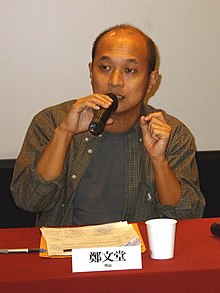Cheng Wen-tang
Cheng Wen-tang | |
|---|---|
 Cheng in 2007 | |
| Born | 1958 (65–66) Yilan County, Taiwan |
| Alma mater | Chinese Culture University |
| Family | Enno Cheng (daughter) |
Cheng Wen-tang (Chinese: 鄭文堂; born 1958) is a Taiwanese director and producer. He got his start creating documentaries on social movements in 1980s Taiwan. He began creating narrative films in the 1990s and has gone on to collaborate with his daughter, singer Enno Cheng, on several projects.
He has served president of the Kaohsiung Film Festival and is a part-time assistant-professor level teacher at National Chengchi University.
Early life
[edit]Cheng was born in Yilan County, Taiwan in 1958 and grew up in Luodong.[1] He graduated from Chinese drama school of the Chinese Culture University.[2]
Career
[edit]Cheng got his start in filmmaking making documentaries, with a focus on social movements in 1980s Taiwan.[2] He made his first television film debut with Lanyang River Youth (1998).[2]
Cheng's first collaboration with his daughter, Enno Cheng, was on Badu's Homework. The short film was her writing debut at 16 and won Best Short at the 2003 Golden Horse Awards.[2]
Cheng began serving as president of the Kaohsiung Film Festival in 2004.[3]
The National Palace Museum commissioned Cheng to produce a short film with a NT$8,000,000 budget. Given the size of the budget, he convinced the museum to turn the project into a feature length film that could be released commercially; Cheng brought in another NT$1,000,000 for the budget. The Passage later earned NT$1,100,000 at the box office and was entered into the Tokyo Film Festival.[1]
His second feature Somewhere Over the Dreamland (2002) is about two Aboriginal Taiwanese men's adventure in urban Taipei. It was screened at the 59th Venice International Film Festival as part of the International Critics' Week section.[4]
Cheng has taught at National Chengchi University's College of Communications as an assistant-professor level contracted teacher since 2012.[5]
Cheng and Chang Yih-feng collaborated on the music video for "Supreme Pain for the Tyrant", Chthonic's song from their 2013 album Bu-Tik.[6]
Style and themes
[edit]Cheng has expressed an admiration for realism, specifically the works of authors Huang Chun-ming and Chen Yingzhen and director Ken Loach.[1]
Personal life
[edit]Cheng is the father of singer-songwriter Enno Cheng.[7]
Filmography
[edit]| Year | Title | Original Title | Director | Notes |
|---|---|---|---|---|
| 1998 | Lanyang River Youth | Television film | ||
| 1999 | Postcard | Yes | short | |
| 2002 | Somewhere Over the Dreamland | 夢幻部落 | Yes | |
| 2003 | Badu's Homework | Yes | short | |
| 2004 | The Passage | 經過 | Yes | |
| 2005 | Blue Cha Cha | 深海 | Yes | |
| 2007 | Summer's Tail | 夏天的尾巴 | Yes | |
| 2009 | Tears | 眼泪 | Yes | |
| 2011 | 10+10 | 20 5-minute short films; "Old Man & Me" segment[8] | ||
| 2015 | Maverick | 菜鳥 | Yes | |
| 2017 | Tshiong | 衝組 | Yes |
Awards and nominations
[edit]| Year | Award | Category | Work | Result | Notes |
|---|---|---|---|---|---|
| 2009 | 46th Golden Horse Awards | Best Original Screenplay | Tears | Nominated | along with Cheng Jin Fen and Chang I-Feng |
| 2010 | Taipei Film Awards | Best Director | Won |
References
[edit]- ^ a b c Chang, Shih-lun (May 2006). "Director Cheng Wen-tang--Finding Utopia Through Film". Taiwan Panorama. Retrieved August 29, 2021.
- ^ a b c d Lee, Wing-Sze (November 1, 2007). "Also Showing: Cheng Wen-tang & Enno Cheng". South China Morning Post. Archived from the original on 2018-04-19. Retrieved 2021-08-30.
- ^ Lan, Tsu-wei (2009-10-06). "INTERVIEW: Film director fights for freedom of expression - Taipei Times". Liberty Times. Archived from the original on 2009-10-08. Retrieved 2021-08-28.
- ^ Yu, Sen-lun (2002-08-07). "Venice becomes Chinese - Taipei Times". Taipei Times. Archived from the original on 2021-08-28. Retrieved 2021-08-28.
- ^ "home > People > Adjunct > WEN-TANG CHENG". National Chengchi University. Archived from the original on 2020-09-24. Retrieved August 29, 2021.
- ^ "Exclusive: ChthoniC Premiere New Music Video, "Supreme Pain for the Tyrant"". Revolver. June 10, 2013. Archived from the original on June 13, 2013. Retrieved June 17, 2013.
- ^ Ho Yi (2007-11-16). "Last throes of youth - Taipei Times". Taipei Times. Archived from the original on 2007-11-16. Retrieved 2021-08-28.
- ^ "Taiwanese filmmakers head for 62nd Berlinale - Taipei Film Commission". www.filmcommission.taipei. February 2, 2012. Archived from the original on 2021-08-30. Retrieved 2021-08-30.
